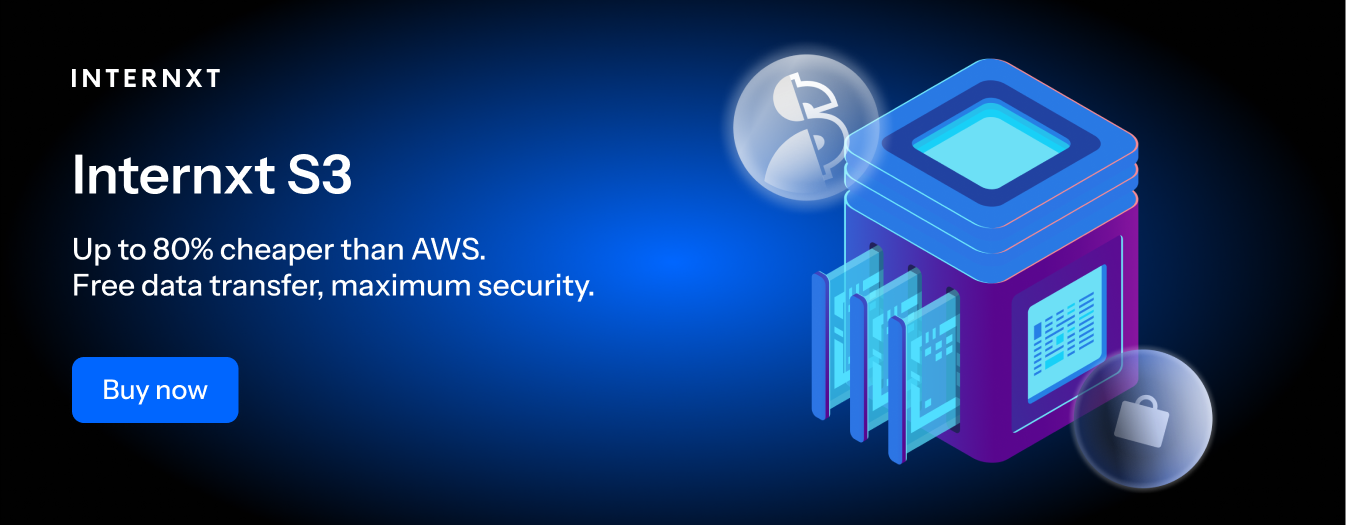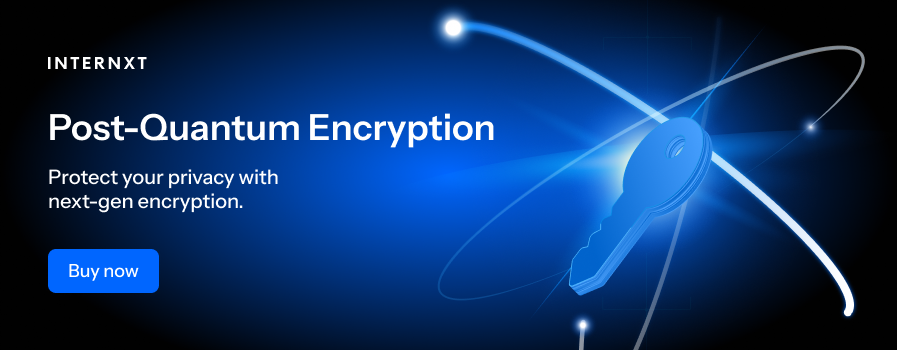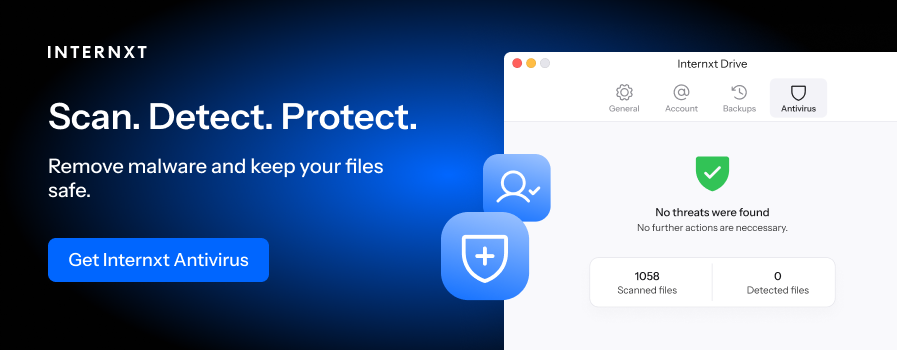Cloud Backup Advantages and Disadvantages: What You Need to Know

Are you one of the 20% of people who have never backed up your data?
If this is the case, the impact could be huge.
Not backing up your data in the cloud leaves your files vulnerable to data loss, corruption, ransomware, and many other cyberattacks that threaten the security and privacy of our files.
If you’re interested in moving your files away from bulky hardware, you may be considering the cloud backup advantages and disadvantages of storing your files in the cloud.
If this is the case, not to worry! We cover everything you need to know about file backups, including how to recover your backed-up files from Internxt Drive, so you can protect your files and prevent data loss.
Table of contents
- Why you should back up your files in the cloud
- Different kinds of cloud backups
- Cloud backup advantages and disadvantages
- Advantages
Why you should back up your files in the cloud
Cloud storage backup solutions offer many advantages for securing and protecting your essential data.
Imagine you have hundreds of photos you want to save of family, friends, and special occasions stored in the cloud that accidentally get deleted, lost, or encrypted by ransomware as a service (RaaS) attacks. Without cloud backups, you could lose all these photos in an instant, and recovering them could be close to impossible.
But, it’s not all doom and gloom if you backed up these photos.
By backing up your files, you create duplicate copies in the cloud. This means that even if your device becomes corrupted or attacked with ransomware, your backups are stored safely in the cloud for you to download and recover.
Finally, businesses must back up files in the cloud to meet compliance regulations and retain and protect legal and financial data for industry-specific requirements. If businesses don’t safely back up data in the cloud, they could face millions in data breaches and compliance fines.
Even though there are cloud backup advantages and disadvantages, there are more pros than cons. Even though there may be disadvantages, these can be prevented with the right backup provider and backup best practices.
Different kinds of cloud backups
Fortunately, there are many options available, so if you're wondering what are the two types of cloud backup methods available, we will explain each of them, offering different advantages and disadvantages depending on how you want to secure your files.
The most common type is a full backup, which duplicates all the data on the device for quicker data recovery, but this is more time-consuming and takes up a lot of storage space.

Mirror backups are similar to full backups. The difference is that the backup copies (mirrors) the files that exist in the source. If you add, edit, or delete a file, it is replicated in your backed-up files.
Next are incremental and differential backups. An incremental backup copies your data since the last backup, which can be timestamped to identify any changes to the file. Differential backups save only what changed since the previous full backup, so they use more storage space, but data recovery is faster.
Therefore, the cloud backup advantages and disadvantages of these different backup types must be considered and understood clearly before you choose your cloud backups.
Cloud backup advantages and disadvantages
Now you know why backups are important and the different kinds available, it’s now time to consider some cloud backup advantages and disadvantages.
By the end of this article, you should have everything you need to manage your cloud with ease for fast data recovery in the event of cyberattacks or accidental data loss.
Advantages
Although the benefits of backing up your files outweigh the negatives, it's important to consider all cloud backup advantages and disadvantages to ensure you choose the right backup solution for you.
Security
Backing up your files with cloud storage means that when they are duplicated and stored, they are protected with end-to-end encryption. This secures your files and keeps your data private from hackers, because they cannot view or access the encrypted data.
Internxt Drive, for example, is a zero-knowledge cloud storage provider and the first to use post-quantum encryption. By combining these two encryption methods, Internxt ensures that your backups and data are kept private and secure from hackers, ransomware, or data breaches.
Ransomware protection
Ransomware attacks on organizations increased in 2024 to 5,414 published attacks, an 11% increase from 2023. The healthcare industry is consistently the most targeted organization, with 25.6 million healthcare records compromised.
Cloud backups significantly reduce the risk of ransomware. Even if your device becomes infected, you can access and download your backups from a separate device, recovering a clean version of your files that a ransomware attack hasn't encrypted.

Affordability
Investing in hardware for backups can become costly for businesses due to maintenance, server, and employee costs to ensure the integrity, security, and functionality of the cloud infrastructure of the backed up files.
Most cloud providers offer backups with subscription plans, like Internxt Drive, or pay-as-you-go models, such as Internxt S3, an object storage solution for a fixed rate of €7/TB/month, with zero data transfer fees.
Scalability
Related to the affordability of backups, managing and adding more hardware for backups can become costly and result in company downtime to set up the new hardware.
Cloud providers easily solve this problem; all you have to do is update your subscription and payment plan to add more storage, and you will be able to add more storage and backups to your account.
Low maintenance
With cloud storage, you can easily maintain your backups from your account, as the cloud provider handles all the software security updates. This will help you reduce business costs and avoid data loss and downtime.
To maintain your backups in the cloud, you can schedule them in Internxt Drive to ensure you have the most recent version available or manually back up your files whenever you need to. Internxt handles all the security and updates for you.
Sustainability
Cloud providers work with data centres that aim to reduce their carbon footprint for a more sustainable and green future. By working with cloud providers, your business can save money on maintaining physical servers in-house and help contribute to a more sustainable future.
If you want to choose a cloud provider that values a greener environment, Internxt Drive uses energy-efficient data centres for a clean, sustainable future.
Check out more information from our green cloud computing page.

Disadvantages
When buying any product, you must be aware of the potential disadvantages. Sometimes, the disadvantages can’t be avoided, but they can be planned for to reduce their impact.
Relies on an internet connection
To get the best out of your cloud service, you need a stable and reliable internet connection to back up, access, and recover your files.
Businesses should also be aware that backing up large amounts of data could slow down the network and potentially affect the company's operations during peak usage hours.
Reduced control
Smaller businesses may choose cloud backups to reduce the workload and costs of the IT teams needed to maintain backup performance and security.
However, larger companies may find that their lack of control over storing data with an external company is a disadvantage because the data is highly confidential.
If reduced control is a concern, you can research the company's compliance standards, such as GDPR compliance for European tech companies, or opt for hybrid cloud storage, which combines private and public cloud storage.
Security and privacy concerns
Data breaches are a huge concern, and due to the sensitivity of files you store and backup in the cloud, many companies and individuals are rightly cautious about what data they store online.
How to recover your data from cloud backup
Internxt Drive offers secure, encrypted file backups for all its paid plans. On top of zero-knowledge cloud storage and backups, you also get access to VPN, Antivirus, and Meet and Mail when they are released (Premium and Ultimate plans).
Here’s how to recover your backed-up files from Internxt Drive:
- Download the app for Windows, Mac, or Linux here
- From the app, go to Settings > Preferences
- Select Backups from the top menu
- From here, you can add, schedule, and delete your backups
- To download your backups, click “Download” and choose where you want your files to be downloaded on your device.
How Internxt can help protect your backups
Internxt uses advanced post-quantum encryption and zero-knowledge policies to store, share, and back up your files for back up your files for Linux, Windows, and Mac in complete privacy.
With a Drive account, you have complete control of the encryption process, as everything is owned, managed and encrypted on your device, preventing anybody from accessing your backups.
Additional security measures to protect your backups include 2FA, and data redundancy, which stores multiple copies of your files across different data centres, ensuring versions of your backups are always readily available.

For businesses, Internxt S3 is a hot storage solution for backing up large amounts of data, and your files are also end-to-end encrypted for maximum security.
Whichever option you choose, you can be sure that with Internxt, your files are kept secure, private, and always accessible no matter what happens to your device.

